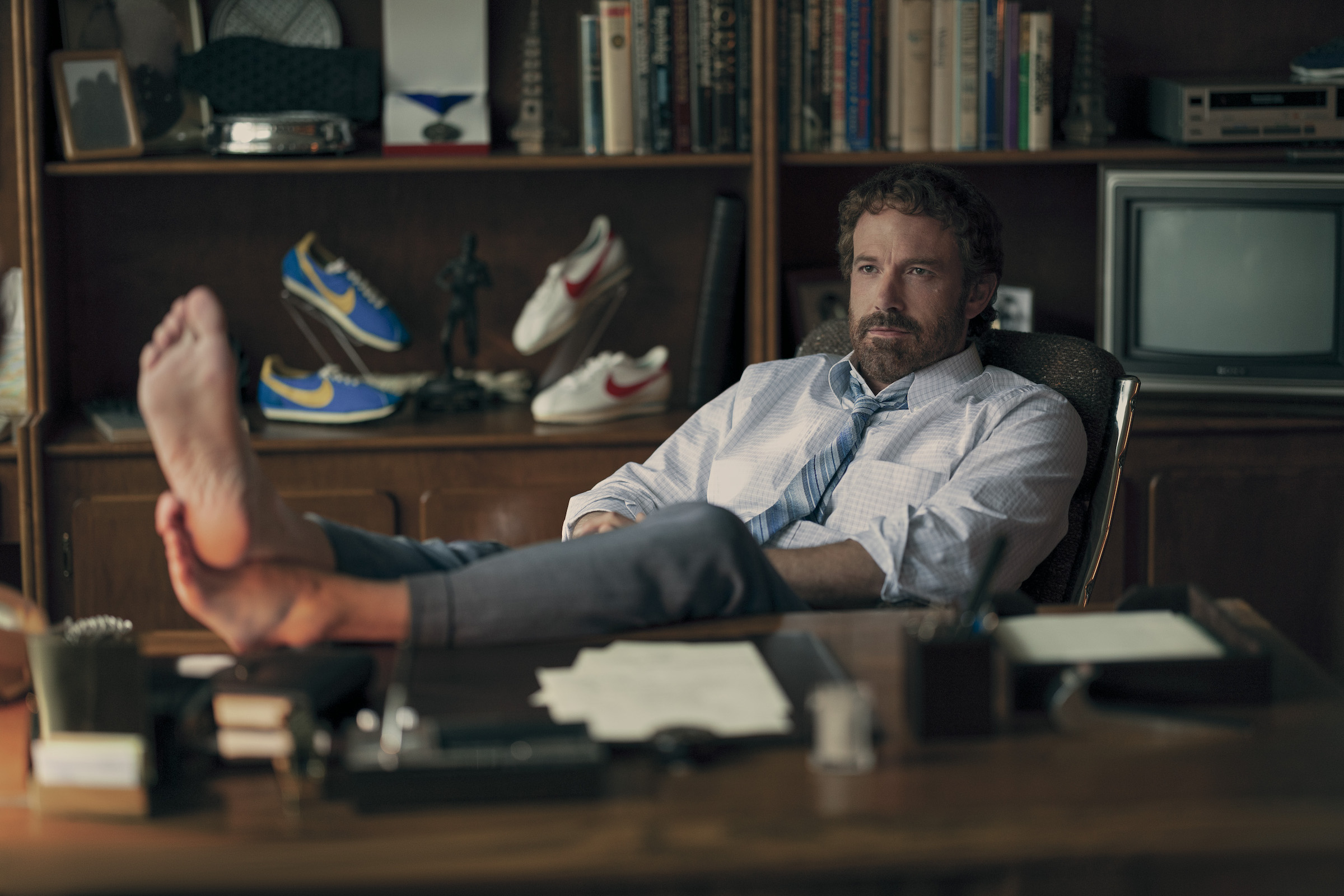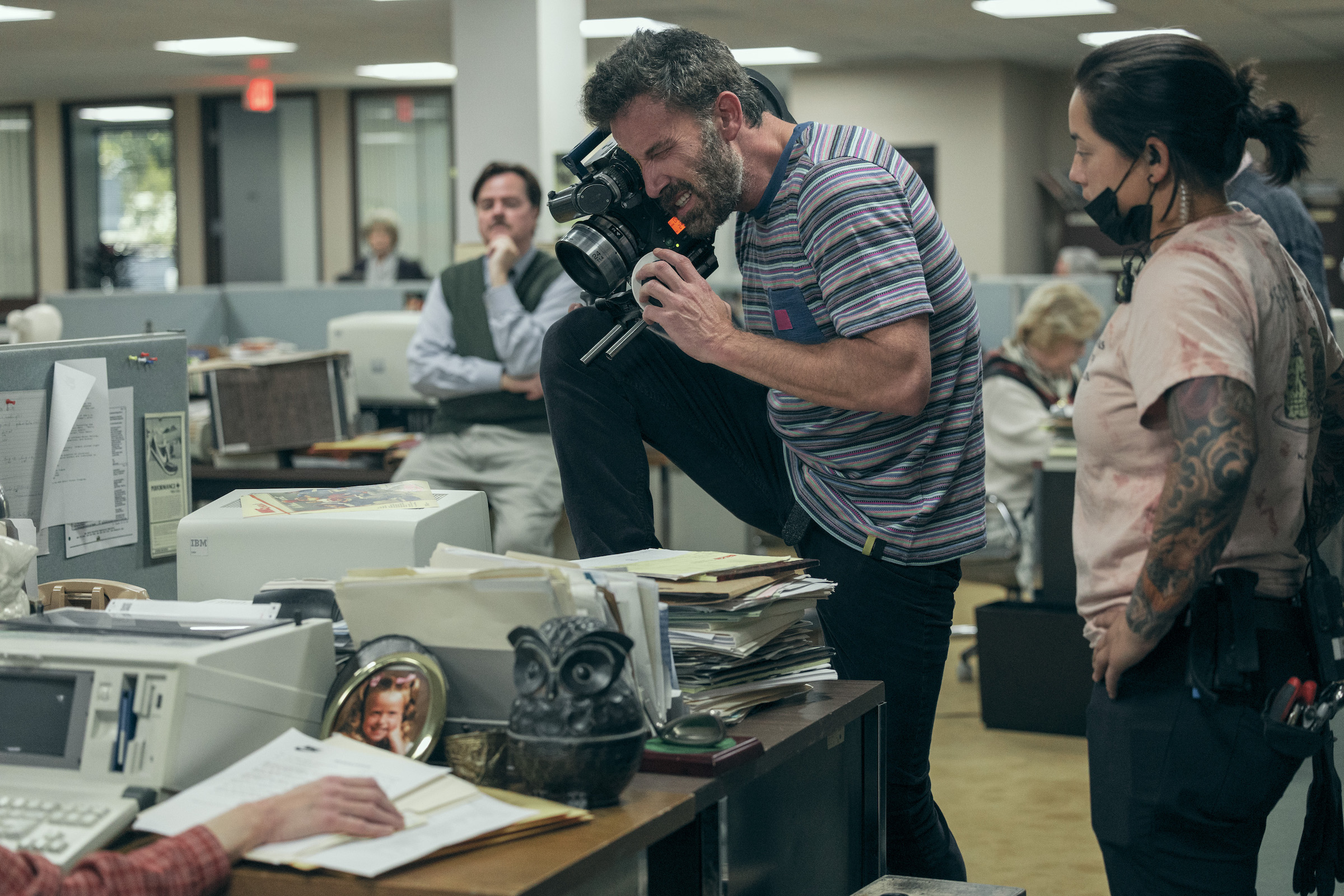For a writer-director-actor who’s had every chance to sit on top of the world, few have cultivated an aura of pathos like Ben Affleck. We’ve seen him staring mournfully at the roaring surf, a garish and probably-not-temporary tattoo splayed fully across his back, his flabby middle-aged middle ignominiously wrapped in a blue towel. Gazing into middle space during a promotional interview for Batman v Superman, as if he’d suddenly realized he’d just parceled out the last drop of his soul, made him one of the greatest meme subjects of 2016. A failed relationship with diamond girl Jennifer Lopez, followed by an era of presumed contentment with girl-next-door charmer Jennifer Garner and the couple’s three children, followed by a recrimination-filled breakup, an alleged affair with his kids’ nanny, and eventually a rekindling of the Affleck-Lopez flame, with much soul-searing contemplation between each step: that’s been the Affleck way. I grow old, I grow old, I shall ignobly clutch a massive Dunkin’ Donuts order to my chest lest the whole thing tumble to the ground, which it will do anyway. No one has played out the doleful pantomime of middle-aged male insecurity as visibly as Affleck has.
Yet somehow, in spite of his woebegone spirit or because of it, he has become one of the most reliably valuable directors we’ve got, as well as an actor whose performances consistently range from good to low-key great. His new movie as a director, Air, is set in the 1980s, but it feels like a movie made in the 1990s—the kind that not even directors who were actually working in the 1990s seem to know how, or are able, to make anymore.
Air is based on the true story of how a running-shoe company, lagging behind the competition, revived its fortunes with a legendary licensing deal. Not everyone knows the story of that deal, though everyone knows the shoe: the Nike Air Jordan, produced specially for Michael Jordan in late 1984, during his second season with the Chicago Bulls, was like no other basketball shoe that had come before it, a symphony of swooping contours and cushiony-looking soles, a shoe perpetually poised for takeoff. Air the movie chronicles the evolution of the deal that made that shoe, and Nike’s surprise turnaround, possible: it was pushed through thanks to the unbending will of a Nike marketing executive named Sonny Vaccaro, played in the film by Matt Damon, Affleck’s longtime friend and Good Will Hunting co-writer. If the Oscar they won for that screenplay were a human being, it would now be old enough for graduate school.

Affleck appears in Air too, in a smallish role as Nike cofounder and CEO Phil Knight, an iconoclast who makes crucial business decisions while running and has a penchant for padding around the office barefoot. He’s wonderful in the part, capturing a specific kind of genius that’s half zonked-out, half ultra-disciplined. But the movie around him is the real wonder, not because it’s a big, awards-baiting project that calls attention to itself, but because it’s the exact opposite: the kind of smart, well-acted, well-crafted picture that you used to see at least once a month, maybe more, in the 1990s—the very decade in which Affleck began to build his career as an adult, after racking up a handful of small TV roles in the 1980s.
More from TIME
There are certain 1990s movies that appear regularly on social media, either as certified classics, great nostalgic memories for Gen-Xers, or pictures that are simply finding new life with younger audiences. Goodfellas, Clueless, Heat, American Beauty, Jackie Brown: these are examples of films that commonly pop up on people’s radars when they think of that decade. But you can easily make a much longer list of good-to-great ‘90s films, of all genres, that cycled through cinemas simply as a matter of course. Donnie Brasco, This Boy’s Life, Carlito’s Way, The Rainmaker, The Insider, The Pelican Brief, Malcolm X, Double Jeopardy, Three Kings, The Last of the Mohicans, The Freshman, What’s Eating Gilbert Grape, A Perfect Murder, The Frighteners, The Quick and the Dead—or even Good Will Hunting, which seemed to come out of nowhere, even though it featured a big star, Robin Williams. Some of these films got great reviews at the time; others were either underappreciated or simply judged somewhat harshly in the context of other contemporary releases. Overall, though, they paint a stark contrast to the paucity of solid, mainstream movies that get made for adults today, either by the big-name streaming services or what remains of the major studios. Grown-up moviegoers in the 1990s didn’t know how good they had it.
Air, Affleck’s fifth movie as a director, may sound like a bore if you don’t care about business, basketball, or athletic shoes. But Affleck, working from a script by Alex Convery, uses classic stealth means to make you care. It’s 1984 and Damon’s Vaccaro, a middle-aged businessguy in need of a hit, finds himself against a wall: he’s having trouble finding a young, up-and-coming basketball player to represent Nike products. Many of the names he and his colleagues float have been all but forgotten today, but one keeps coming up: the company would love to have a rookie named Michael Jordan wear their shoes, but he’s already promised his allegiance to another company, Adidas.
Vaccaro won’t let the idea go, and hatches a scheme in which Nike would spend its whole budget, $250,000, to get Jordan, rather than spreading it among several players. His boss, Affleck’s Knight, isn’t convinced; nor is the company’s VP of marketing, Rob Strasser (Jason Bateman), who, in a stretch of potentially sentimental dialogue that only an offhandedly expressive actor like Bateman could pull off, reveals that Nike’s shoes are the one thing that make him seem like a big deal to his seven-year-old daughter, whom he sees only weekly thanks to his recent divorce. That speech is used to underscore how much Strasser’s job means to him, and how much he risks if he loses it, which is what will happen if Vaccaro doesn’t pull off this long-shot stunt.

It’s not giving the ending away to reveal that he does—but only after earning the trust of Jordan’s mother, Deloris, played with steely warmth by Viola Davis. (Jordan, who gave his blessing to the movie, had hoped Davis would play his mother.) Though Affleck has a lot to work with here, there’s also plenty to mess up. But he keeps the picture humming briskly: We never see Jordan’s face in Air, which makes sense for a figure who’s larger than life. (The suitably lanky young actor playing him, seen only in flashes, is Damian Delano Young.) In one scene, Nike’s chief designer Peter Moore (played, superbly, by Matthew Maher) fantasizes about the fantastic shoe he’s going to design for Jordan. When he finally reveals the prototype to Strasser and Vaccaro—they’ve spent the whole weekend at the company’s Beaverton, Oregon, headquarters, in preparation for a Monday morning visit from Jordan and his parents—they see the shoe, but we don’t: it glows from the confines of a lit-up Lucite box, and they behold it like knights stumbling upon the Holy Grail.
That’s as apt a symbol as any for the beginning of sneaker culture as we know it, and you can tell Affleck takes pleasure in visual touches like that. (It also doesn’t hurt that his cinematographer is revered veteran Robert Richardson.) We already know Affleck is a good director: no one has really forgotten that his third picture as director, the tense, clever based-on-real-life rescue drama Argo, won the Oscar for Best Picture in 2013. But although he gave an astonishing, and underappreciated, performance in the 2020 film The Way Back, his last picture as a director, the Prohibition-era thriller Live By Night (2016), was both ambitious and unwieldy. In the time since, the recurring Affleck memes, not to mention the distraction of his bulked-up Batman physique, may have blurred our memories of his filmmaking gifts.
We know more about Affleck than we do about the personal lives of most directors. That’s what happens when you marry a famous pop star and the two of you become the real-life incarnation of the idea of “the comedy of remarriage,” a popular theme of 1930s comedies but a schematic that doesn’t play out all that often in real life. It’s no wonder so many of us kind of love Ben Affleck, to the extent that we have any real idea of who Ben Affleck really is.
Women are always rolling their eyes at men, especially at successful straight white men. It’s probably what eye sockets were invented for. And we’ve rolled our eyes at Affleck, too. (So what did happen with the nanny, and when?) But we’ve also seen him, in Internet terms at least, at his lowest, contemplating his worth as a man and finding it wanting. Then he comes out and makes a casually superb little movie, almost as if it were no big deal to do so. There’s no other filmmaker-actor who, frame for frame and meme for meme, has given us as much pleasure. He deserves all the doughnuts, and then some.
Correction, April 6
The original version of this story misstated how many films Ben Affleck had directed before Argo. It was his third picture as director, not his second.
More Must-Reads from TIME
- Cybersecurity Experts Are Sounding the Alarm on DOGE
- Meet the 2025 Women of the Year
- The Harsh Truth About Disability Inclusion
- Why Do More Young Adults Have Cancer?
- Colman Domingo Leads With Radical Love
- How to Get Better at Doing Things Alone
- Michelle Zauner Stares Down the Darkness
Contact us at letters@time.com
